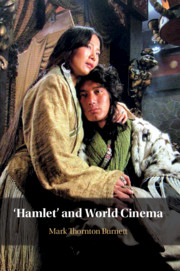Book contents
- ‘Hamlet’ and World Cinema
- ‘Hamlet’ and World Cinema
- Copyright page
- Dedication
- Contents
- Figures
- Acknowledgements
- A note on texts and titles
- Introduction
- Chapter One Hamlet, Cinema and the Histories of Western Europe
- Chapter Two Thematizing Place: Hamlet, Cinema and Africa
- Chapter Three Hamlet and the Moment of Brazilian Cinema
- Chapter Four Pairing the Cinematic Prince: Hamlet, China and Japan
- Chapter Five Hamlet and Indian Cinemas: Regional Paradigms
- Chapter Six Gendering Borders: Hamlet and the Cinemas of Turkey and Iran
- Chapter Seven Materializing Hamlet in the Cinemas of Russia, Central and Eastern Europe
- Filmography
- Bibliography
- Index
Introduction
Published online by Cambridge University Press: 21 June 2019
- ‘Hamlet’ and World Cinema
- ‘Hamlet’ and World Cinema
- Copyright page
- Dedication
- Contents
- Figures
- Acknowledgements
- A note on texts and titles
- Introduction
- Chapter One Hamlet, Cinema and the Histories of Western Europe
- Chapter Two Thematizing Place: Hamlet, Cinema and Africa
- Chapter Three Hamlet and the Moment of Brazilian Cinema
- Chapter Four Pairing the Cinematic Prince: Hamlet, China and Japan
- Chapter Five Hamlet and Indian Cinemas: Regional Paradigms
- Chapter Six Gendering Borders: Hamlet and the Cinemas of Turkey and Iran
- Chapter Seven Materializing Hamlet in the Cinemas of Russia, Central and Eastern Europe
- Filmography
- Bibliography
- Index
Summary
In Tardid/Doubt (dir. Varuzh Karim-Masihi, 2009), a stylish and innovative Iranian film adaptation of Hamlet, ‘To be, or not to be’ is allusively referenced. In an archivist’s cluttered and grimy basement office, the camera zooms in on a framed quotation in Farsi hanging on the walls, but, rather than the words of the Qur’an, as might be expected, it is the opening lines of Shakespeare’s most famous soliloquy that are visualized. The power and reach of the lines were brought home to me on a blustery autumnal day in 2014 as I made plans to interview Tardid’s director and speak at the inaugural ‘First International Conference on Shakespeare in Iran’. In search of an elusive visa, and in the context of the closure of the Iranian Embassy in London, I presented myself at the Iranian Embassy in Dublin. Once beyond the forbidding gates, the official in charge leaned in towards the glass separating us and inquired rather fiercely as to the purpose of my visit. Eager to ingratiate myself, I explained that I was keen to speak at the first Shakespeare conference in Iran. The official seemed uncomprehending, and a barrage of unpromising questions followed. At no point did I mention Hamlet. But, after ten minutes back and forth, he beckoned me closer and, with a half-smile playing around his lips, whispered, ‘To be, or not to be’, before whipping away my passport for approval. Left alone, I wondered if he knew of the Qur’an-like soliloquy in Tardid or perhaps was aware of the long-standing traditions of translation and performance of Shakespeare in the Middle East. Whichever way, the brief moment of connection was typical of the often humbling encounters that have informed my thinking about Hamlet’s cinematic kudos and power in the world.
- Type
- Chapter
- Information
- 'Hamlet' and World Cinema , pp. 1 - 22Publisher: Cambridge University PressPrint publication year: 2019



